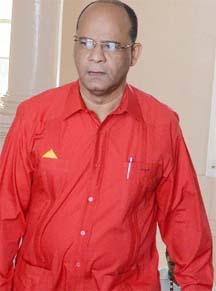Minister of Home Affairs Clement Rohee caused hilarity in Parliament on February 10 when he suggested that during the period around elections 2011, there had been an increase in the number of juvenile inmates at the Sophia holding facility and there had been a consequent rise in the cost of feeding them.
When asked about the increase in expenditure for dietary supplies at the Sophia Juvenile Detention Centre, Rohee elicited laughter when he responded that he could not have predicted the effectiveness of law enforcement.
After a voted provision of $31 million in the 2011 budget, the Home Affairs Ministry was requesting an additional $1.5 million in Financial Paper 7/2011 for the provision of meals. At this sitting of the Committee of Supply, the opposition voted against four items on Financial Paper 7/2011 and rejected the entire Financial Paper 8/2011, citing a paucity of detailed information.
Former Commissioner of Police Winston Felix of APNU asked the Minister of Home Affairs whether at the time of the budget he did not know that it was necessary for adequate dietary items to be provided for the Sophia inmates. He also asked the size of the increase in the number of inmates.
“Madame Chairman, the effectiveness of law enforcement in this respect is not something that could be easily predictable,” Rohee responded; “therefore I was not in a position to predict that the number of inmates would have increased.” He went on to say that the government had to make sure that the inmates were well fed.

He said that there are currently 44 inmates at this facility and the number of inmates increased just around the time of elections in November 2011. “The monies [sought] for dietary for the inmates are quite justifiable given the effectiveness of law enforcement,” Rohee said.
Former Finance Minister in the PNC Carl Greenidge then asked, “Am I to understand the Minister to be saying that there was an increase [in inmates at the detention centre] because of elections?” This Deputy Speaker of the National Assembly, in her capacity as Chairperson of the Committee of Supply, said that this seemed to be the understanding.
On a different chart of account item, Felix asked the Minister of Home Affairs why an expenditure of $94.2 million for fuel and lubricants could not have been anticipated during the preparation of the 2011 budget, since it had been known that elections would have been taking place in 2011.
Rohee answered and said that the increased expenditure had to do with the increased cost in fuel and the heightened need to carry out patrols. He said also that the police had acquired new vehicles and the additional expenditure had to do with supplying fuel and lubricants for those vehicles.
Regarding an allocation of $206 million for the maintenance of drainage and irrigation structures, APNU’s Amna Ally asked whether the Minister of Agriculture could say what steps that ministry had taken in preparation for the rainy season.
Dr Ramsammy said the allocation for 2011 for the NDIA was $1.1 billion. He said that in the submission to the Ministry of Finance for the NDIA, the Ministry of Agriculture had requested $1.5 billion. “We were not given that amount, we were given $1 billion dollars. In June/July we had indicated to the Ministry of Finance in anticipation of the recess that we would need a supplementary of $410 million to take us to the end of the year and the activities would include making sure that all the pumps were working, making sure that we have fuel and lubricants, etc,” he said.
He continued that the Ministry of Finance in September through a supplementary “gave us $210 million.” He said that this amount still left the Ministry of Agriculture short.
He noted that soon after the Parliament dissolved, the ministry had to carry out a number of activities and this caused further expenses to be incurred. “Madame Chair, we presently have in our fleet of equipment 60 excavators and bulldozers and we also operate 43 pumps across the country. We also support Water Users Associations – 11 of them – across the country, that are in charge of 470,000 rods of drains, canals and channels,” he said.
He went on to say that the $206 million that the ministry is requesting is broken down into $52 million for emergency works and the maintenance of approximately 376,916 rods of D&I channels within the WUA areas. He said that $42 million was utilized to offset the expenses of purchasing fuel and lubricants, while $82 million was spent on the procurement of spare parts and maintenance and $30 million to support additional labour costs and other management expenses.
Ally asked why the preparations which the Minister elaborated on had not prevented flooding in Mahaicony, East Coast, Pomeroon and other areas.
Dr Rupert Roopnaraine of APNU asked whether the government is closer to the point of having the NDIA, which is supposed to be an autonomous agency, receive its own money and account for it. He noted the findings of the latest Auditor General’s Report which pointed to the failure of the Ministry of Finance to hand over NDIA appropriations to the NDIA “so that they could in effect spend their money and make a report to the National Assembly.”
The Minister answered and said that while the agency uses all its money, there has not been the establishment of a separate accounting unit. One constraint, he said, is the increase in staffing that will be required. “We have one accounting department that manages the accounts of each of these agencies,” the Minister said, referring to the agencies that come under the purview of the Ministry of Agriculture.
All the above items were passed by Parliament sitting as the Committee of Supply.









